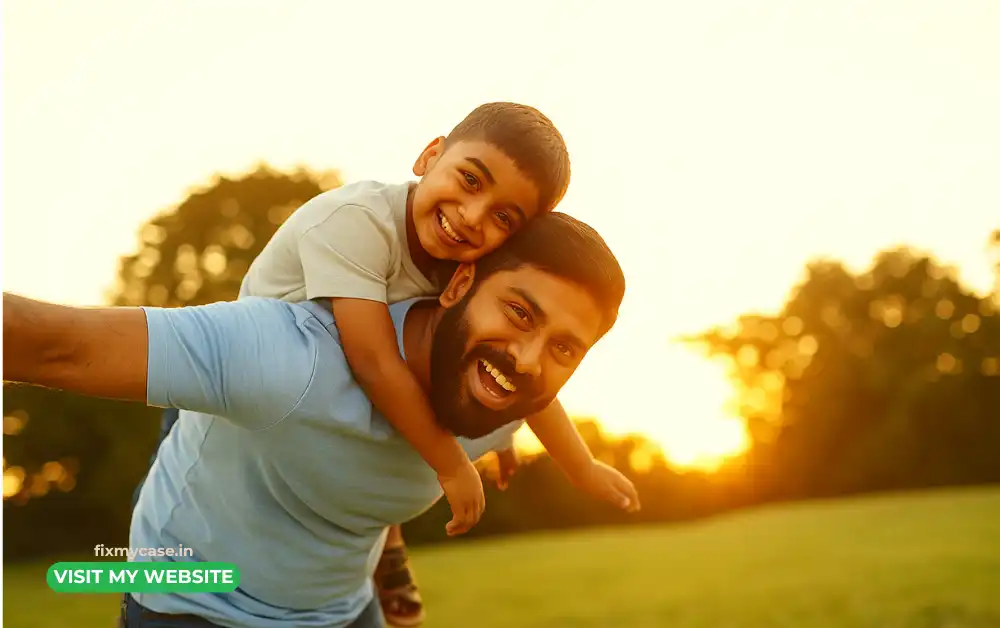
இந்தியாவில், விவாகரத்துக்குப் பிறகு ஒரு குழந்தையின் பராமரிப்பு உரிமையை யார் பெறுவது என்பது குழந்தையின் நலன் மற்றும் நல்வாழ்வைப் பொறுத்தது. இந்தியச் சட்டம் மூன்று வகையான பராமரிப்பு உரிமையை வழங்குகிறது அதை தொடர்ந்து தெரிந்துகொள்வோம்.
உடல் ரீதியான பராமரிப்பு (Physical Custody) :
குழந்தை ஒரு பெற்றோருடன் வசிக்கும், மற்ற பெற்றோருக்குச் சந்திப்பு உரிமைகள் கிடைக்கலாம்.
உதாரணம் : அதாவது தாயுடன் குழந்தை வசிக்கலாம் ஆனால் தந்தையுடன் குழந்தை வசிக்க முடியாது ஆனால் பார்ப்பதற்கு பழகுவதற்கு உரிமை வழங்கப்படும்.
கூட்டுப் பராமரிப்பு (Joint Custody) :
இரு பெற்றோர்களும் பராமரிப்பு உரிமையைப் பகிர்ந்து கொள்கிறார்கள் மற்றும் குழந்தையின் பராமரிப்பை மாற்றி மாற்றி கவனித்துக் கொள்கிறார்கள், இரு தரப்பிலிருந்தும் பங்களிப்பு இருப்பதை உறுதி செய்கிறார்கள்.
உதாரணம் : ஒரு சில நாட்கள் குழந்தை தாயுடனும் ஒரு சில நாட்கள் குழந்தை தந்தையுடனும் வசிக்கலாம் அதற்கான உரிமையை நீதிமன்றம் வழங்குகிறது இதனால் தாய் தந்தை இரண்டு பேரும் குழந்தையின் பராமரிப்பில் பங்கெடுக்க முடியும்
மூன்றாம் தரப்பு பராமரிப்பு (Third-Party Custody) :
எந்தவொரு பெற்றோரும் தகுதியற்றவர்களாகக் கருதப்பட்டால், பராமரிப்பு உரிமை ஒரு மூன்றாம் தரப்பினருக்கு வழங்கப்படலாம்.
உதாரணம் : குழந்தையின் குழந்தையின் தாத்தா பாட்டிக்கு பராமரிப்பு உரிமையை நீதிமன்றம் வழங்கலாம்.
சட்ட கட்டமைப்புகள்:
குழந்தையின் பராமரிப்புக்கான பொருந்தக்கூடிய சட்டங்கள் பெற்றோரின் மதத்தைப் பொறுத்தது:
- இந்து திருமணச் சட்டம், 1955 மற்றும் இந்து சிறுபான்மையினர் மற்றும் பாதுகாவலர் சட்டம், 1956: இந்துக்கள், பௌத்தர்கள், சமணர்கள் மற்றும் சீக்கியர்கள் உட்பட பராமரிப்பு உரிமையை நிர்வகிக்கும் சட்டங்கள் ஆகும்.
- முஸ்லீம் தனிநபர் சட்டம்: முஸ்லீம் குடும்பங்களுக்கு வழிகாட்டுதல்களை வழங்குகிறது, பெரும்பாலும் இளம் குழந்தைகளுக்குத் தாயை ஆதரிக்கும் அதே வேளையில் தந்தை இயற்கையான பாதுகாவலராக இருப்பதை உறுதி செய்கிறது.
- கிறிஸ்தவ மற்றும் பார்சி சட்டங்கள்: பராமரிப்பு உரிமைகள் பாதுகாவலர்கள் மற்றும் வார்டுகள் சட்டம், 1890 இன் கீழ் தீர்மானிக்கப்படுகின்றன.
- சிறப்பு திருமணச் சட்டம், 1954: இந்தச் சட்டத்தின் கீழ் திருமணம் செய்துகொண்ட மதங்களுக்கிடையிலான தம்பதிகளுக்குப் பராமரிப்பு உரிமையை இந்தச் சட்டம் வழங்குகிறது.
கருத்தில் கொள்ளப்படும் முக்கிய காரணிகள்:
- குழந்தையின் வயது மற்றும் பாலினம்: இளம் குழந்தைகள் பொதுவாக தாயுடன் வைக்கப்படுகிறார்கள், அதே சமயம் வயதான குழந்தைகள் தங்கள் விருப்பத்தை வெளிப்படுத்தலாம்.
- பெற்றோரின் திறன்: நிதி நிலைத்தன்மை, மன மற்றும் உணர்ச்சி ஆரோக்கியம் மற்றும் குழந்தையைப் பராமரிக்கும் திறன் ஆகியவை மதிப்பீடு செய்யப்படுகின்றன.
- குழந்தையின் விருப்பம்: குழந்தைகள் தங்கள் விருப்பத்தை வெளிப்படுத்தும் அளவுக்கு முதிர்ச்சியடைந்திருந்தால், நீதிமன்றங்கள் அதைக் கருத்தில் கொள்கின்றன.
- ஒழுக்கம் மற்றும் நெறிமுறை சூழல்: குழந்தை வளர்க்கப்படும் சூழ்நிலை கணக்கில் எடுத்துக் கொள்ளப்படுகிறது. அதன் அடிப்படையில் ஒரு குழந்தை யாருடன் வளர்ந்தால் சமுதாயத்தில் நல்ல நலன்களை பெற முடியும் என்பதை நீதிமன்றம் கருத்தில் எடுத்துக் கொண்டு அவர்களுக்கே பராமரிப்புரிமையை வழங்குகிறது.
நீதிமன்றம் எப்போதும் குழந்தைகளுக்கு நிலையான, வளர்க்கும் மற்றும் ஆதரவான சூழலை வழங்கவே இலக்கு கொண்டுள்ளது. இந்த பராமரிப்பு முடிவுகள் இறுதியானவை அல்ல, சூழ்நிலைகள் மாறினால் அவை மறுபரிசீலனை செய்யப்படலாம்.